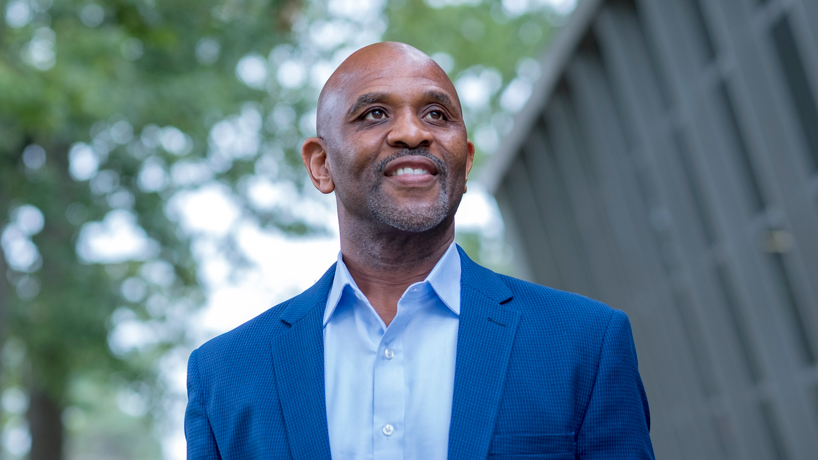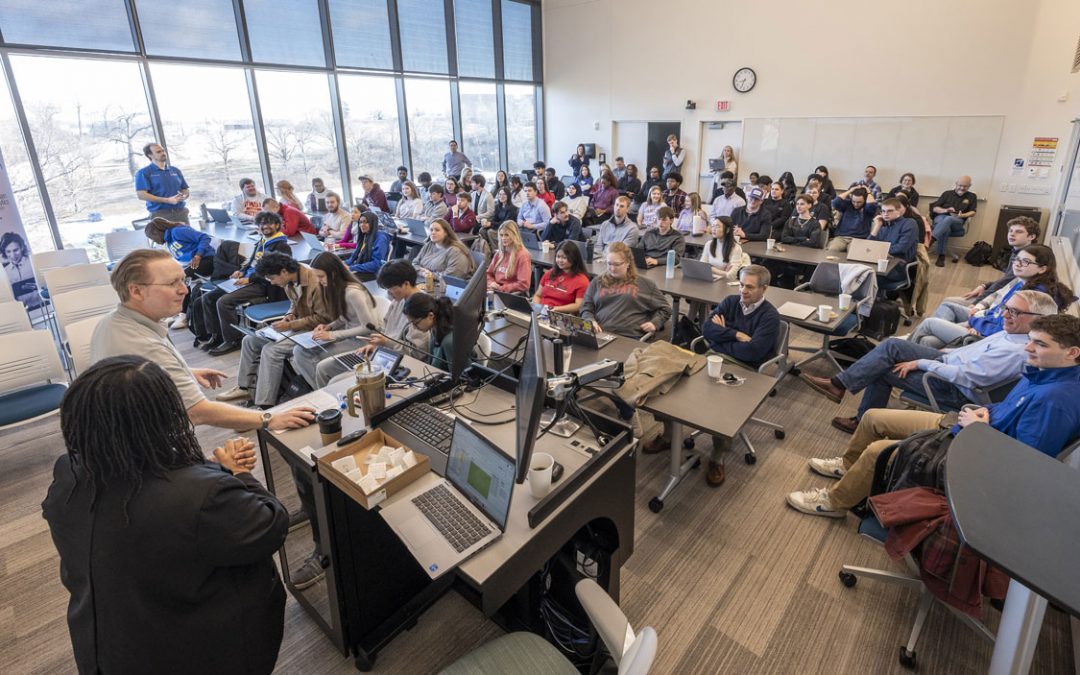
Jerome E. Morris, the E. Desmond Lee Endowed Professor of Urban Education at UMSL, was named a 2022 American Educational Research Association Fellow. Morris has studied the impact of school reforms, as well as the links between race, social class and the geography of educational opportunities and Black communities in the South for more than 20 years. (Photo by August Jennewein)
For more than 20 years, Jerome E. Morris has been one of the country’s foremost scholars on the impact of school reforms, as well as the links between race, social class and the geography of educational opportunities and Black communities in the South.
In recognition of his outstanding research and professional contributions to the field of education, the American Educational Research Association named Morris, the E. Desmond Lee Endowed Professor of Urban Education at the University of Missouri–St. Louis, a 2022 AERA Fellow on Feb. 28.
Morris is the first UMSL faculty member to be selected for the esteemed AERA Fellows program. He joins 17 other noted scholars in this year’s class and 696 total AERA Fellows.
“We are thrilled to honor the 2022 AERA Fellows for their exceptional scholarship and significant contributions to the field,” said AERA Executive Director Felice J. Levine. “AERA Fellows demonstrate the highest standards of excellence. We welcome the class of 2022 to these prestigious ranks.”
The program honors academics for their outstanding dedication and contributions to education research. Nominated by their peers, the 2022 Fellows were selected by the Fellows Committee and approved by the AERA Council, the association’s elected governing body. They will be inducted during a ceremony at the 2022 Annual Meeting in San Diego on April 22.
The nomination came as a surprise to Morris, but he was thrilled to hear the news.
“It recognizes exemplary scholars who have done a body of work – wonderful research – over long periods of time and who have also really been engaged with the organization in a professional way,” he said.
It’s not the first time Morris has earned national recognition as a researcher.
In 2020, he won the Lyle M. Spencer Research Award to Transform Education, receiving $1 million in funding to support a multiyear research project on his theory of communally bonded schooling, “Countering the Unintended Consequences of School Reforms: Communally-Bonded Schools, Reconnecting Black Students, Strengthening Communities and Improving Educational Outcomes.”
Additionally, Morris has written scores of scholarly articles and two books on the topic of urban education, “Troubling the Waters: Fulfilling the Promise of Quality Public Schooling for Black Children” and “Central City’s Blues: Solidarity, Survival, and Soul in a Birmingham Housing Project” (forthcoming).
Morris’ selection to this class of Fellows affirms the significance and quality of his research and his focus on publishing in the top professional journals in the field.
“I’ve been highlighting for years why we need to be thinking about quality education for Black children at the K through 12 level, and I’ve written about that,” Morris said. “I held on to that focus, and one of the things I think it demonstrates is the quality of my work.”
College of Education Dean Ann Taylor echoed the sentiment.
“Professor Morris’ selection as a 2022 Fellow by the premiere professional education research association speaks to his stature and impact as a scholar,” Taylor said. “His passion, focus and commitment drive his research to expose historic racial injustice and to further knowledge that leads to social equity.”
In addition to his sterling work as a researcher, Morris has been highly involved with AERA. He became a member of the organization in the ’90s as a graduate student and has gone on to hold several leadership positions.
Morris first served as a program chair for AERA’s Division G, which represents members researching social contexts of education. He currently sits on the AERA Executive Council and is the vice president of Division G. In his role as vice president, he oversees 3,500 AERA members and is responsible for selecting program chairs to carry out his vision for the organization.
He hopes his selection will shine a light on the impressive research being done at UMSL and encourage others in the College of Education to get involved with AERA.
“I’m trying to inspire and encourage my colleagues in the College of Education – graduate students, as well as faculty members – to think about these major professional associations as a place for them,” Morris said.
Morris is thankful for the recognition, but he believes it extends beyond himself.
“I’m honored to have been recognized as part of an esteemed group of colleagues for the work that I do,” he said. “I’m appreciative that I’m able to leverage this work and bring attention to the people that I work with, as well as those things that I really believed in.”














